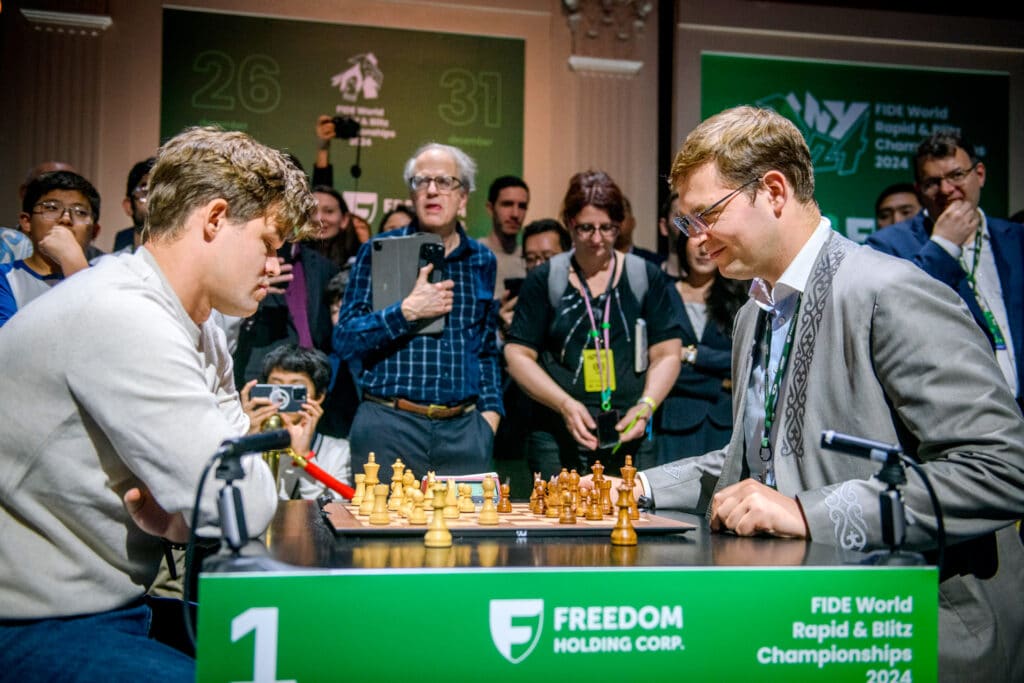Wall Street Gambit: Why is Freedom so passionate about chess?
Freedom Holding Corp. (FRHC), a company from Kazakhstan listed on Nasdaq emerged as a main sponsor of world rapid and blitz individual and team championships in New York, key chess events from late last year. It is worth noting that the company’s CEO Timur Turlov has been serving as president of the Kazakhstan Chess Federation (KazChess) since January 2023. Let’s see what feeds the interest of FRHC in chess and how investments in this sport are connected with the rise of Freedom’s digital ecosystem.

Rapid and blitz championships
The individual rapid and blitz championships, which were actually four different contests — men’s and women’s rapid tournaments and male and female blitz competitions — took place in the last week of December on Wall Street, New York City, the financial heart of the world. The championship’s prize pool totaled $3 million, with $90,000 allocated straight to champions.
The rapid chess tournament concluded with a turnabout, as 18-year-old Volodar Murzin from Russia emerged as the champion. (Russian players can participate in international chess tournaments under the FIDE flag.) Murzin, ranked around 90th in the FIDE ranking, managed to outperform grandmasters like Fabiano Caruana, Nodirbek Abdusattorov and Ian Nepomniachtchi, all ranked within the FIDE’s top 10. The youngest-ever winner of the World Rapid Championship, however, remains Nodirbek Abdusattorov from Uzbekistan, who claimed the title in 2021 at the age of 17.
The women’s division was headed by 37-year-old Humpy Koneru from India, marking her second triumph in the rapid championships with her first title taken in 2019. Bibisara Assaubayeva, the strongest of Kazakhstani female chess players, emerged eighth. Among Kazakhstani men, Rinat Jumabayev achieved the highest ranking — 62nd.
The men’s championship was marked by what was arguably the most sensational incident of the entire contest. Magnus Carlsen, the 16th world chess champion, was first fined and later disqualified for wearing jeans. Notably, all players had been instructed to review the tournament’s rules on the official website prior to the event, which included a dress code specifying smart business attire with jeans explicitly prohibited. Carlsen’s decision to ignore this rule may have stemmed from his ongoing disputes with FIDE.
Nonetheless, Carlsen took part in the blitz contest. As the Norwegian player stated, he decided to continue playing following talks with FIDE President Arkady Dvorkovich and FRHC CEO Timur Turlov. Carlsen, wearing the exact same jeans, displayed exceptional skill, advancing to the final where he faced his long-time rival and friend, Ian Nepomniachtchi. Carlsen won the first two games, while Nepomniachtchi claimed victory in the next two. After three consecutive draws, Carlsen proposed sharing the first place, marking the first co-championship in history.
In the women’s division, Chinese grandmaster Ju Wenjun claimed the champion’s title. The blitz segment saw a stronger performance from Bibisara Assaubayeva, who advanced to the quarterfinals before being defeated by one of the finalists, Chinese player Lei Tingjie, ultimately finishing in 7th place. Among the men, Kazakhstan’s top performer was Kazybek Nogerbek, who secured 22nd place.
What do financial experts think of chess?
During a break between the rapid and blitz championships, the venue hosted a chess and finance conference called Wall Street Gambit. The event featured speakers from the financial sector who are also chess enthusiasts. They shared their views on the connections between chess and finance.
CEO of Freedom Holding Timur Turlov, for example, proposed looking at Freedom’s digital ecosystem through the prism of chess.
«Chess is a universal language, a game that transcends boundaries and establishes common ground,» he emphasized. «Each piece has its own unique power. Similarly, while developing a digital ecosystem, we, like chess players, learned how to coordinate the diverse components of a unified whole, ensuring efficient collaboration.»
«You have to trust in the ecosystem, just as you do in chess,» Turlov elaborated. «During a match, we want the king to be reliably protected and within the ecosystem, it is important to know that our confidential data is properly protected. Just like chess, trust depends on how well the different pieces on the board collaborate with each other.»
Another analogy highlighted by Freedom’s CEO is that, just as in chess, one must anticipate the opponent’s moves. Similarly, when developing a digital ecosystem, it is essential to proactively offer customers new products that satisfy their needs, sometimes even before those needs have been articulated.
One of the conference speakers, Boaz Weinstein, expressed an eccentric perspective on developing essential skills for financiers. The founder of the Saba Capital Management hedge fund became the third-ranked chess player in the U.S. at just 16. Weinstein is also known for his skills in playing poker and blackjack. In fact, he is so skilled that Bellagio in Las Vegas has banned him from playing in the casino. In his speech, Weinstein compared these three games in terms of developing skills that stock market investors may find useful. Poker and investing require a strategical mindset, an understanding of how to control the bet amount, bluffing and advanced intuition. If one lacks numerical skills, it is better not to play blackjack. However, unlike chess, these card games do not urge the development of key traits for investors, such as deep analytical thinking and the ability to identify complex patterns.
Weinstein concluded his speech with the idea that chess problems could be as beautiful and curious as investment decisions.
Kenneth Rogoff, an economist, Harvard University professor and chess grandmaster, centered his speech on his favorite topic: how one can speak about the future with precision by knowing the past. Rogoff said that the economy works like chess since players make decisions after analyzing data. He is convinced that these chess player skills ultimately helped him to take a more practical view of the economic situation in the late 2000s, resulting in predicting the advancement of a world crisis in 2007.
Variety in mid game
The tournament on Wall Street was the third largest chess championship supported by FRHC in 2024. The first was the Asian Youth Chess Championships 2024, held in June, and the second was the FIDE Rapid and Blitz World Team Championship 2024 in Astana last August. Freedom is an official FIDE partner alongside Google Tech Mahindra. On top of that, Freedom supported the bulk of professional and amateur tournaments, including the FIDE World Schools Chess Championships and the FIDE World Corporate Chess Championships.
«Partnering with FIDE in organizing major tournaments will make Freedom Holding more recognizable in Asia, Europe, the U.S. and all over the world among fellow chess enthusiasts,» Turlov said, expressing his confidence.
According to him, Freedom allocates over $10 million annually to support KazChess. Notably, the holding reported $1.6 billion in revenue, with a net income of $375 million for the 2024 fiscal year. Additionally, the company provides extra funds to sponsor FIDE and organize major tournaments.
Furthermore, the FRHC CEO views chess as an effective tool for promoting Kazakhstan on the international stage.
«Kazakhstan isn’t just about oil and gas,» Turlov asserted. «It’s also a hub for innovations and human capital with outstanding potential. For example, over the past two years, we have witnessed major successes for Kazakhstan. The professional level of Kazakhstani chess is very high and I see the progress our national team has achieved in recent tournaments. Apart from Kazybek Nogerbek, who became the world champion among players under 20, we have plenty of outstanding young chess players who will definitely prove their worth in the international arena. And in our holding, we’re proud to support these young talents and provide them with an opportunity to showcase their skills and achieve big success.»
Of course, promoting Kazakhstan’s image is not the only reason behind Freedom’s intentions.
«Chess is a vast community that unites a significant number of financial professionals, bankers, regulators, scientists and simply wealthy people who love the game. By supporting chess tournaments, we can gain access to this circle of people. Moreover, I believe that chess is deeply underrated as a sport — only 20% of the U.S. population plays chess. However, this level of popularity is just the beginning, I have no doubt about it,» Turlov stated.
By the way, the word «gambit» is featured in the conference name for a reason. It accurately describes the strategy adopted by FRHC in terms of chess activities. The green-colored brand entered an unexplored field and earned the opportunity to implement its strategy at low costs.
Chess at home and at school
It’s worth noting that in July 2023, Kazakhstan’s cabinet adopted a comprehensive plan to develop chess until 2027, which is a significant milestone in Freedom’s involvement with the chess topic. The initiative aims to expand chess participation among primary school students from nearly zero to 20%. This includes the introduction of extracurricular chess classes in 1,400 Kazakhstani schools out of 8,000 and the opening of 200 new chess clubs. The program also envisions establishing chess houses and neighborhood chess clubs outside of Astana and Almaty in collaboration with KazChess and with financial support from local executive bodies.
The development plan also includes a high-performance sports component. According to the plan, the Kazakhstani national team is expected to enter the world’s top 10 by 2027. The number of international achievements by Kazakhstani chess players is projected to increase, while five Kazakhstani male chess players under 20 are expected to earn the International Grandmaster title.
Viswanathan Anand, the Indian Grandmaster and a five-time world champion in classic chess, commenting on the Kazakhstani chess initiative, said that he had an experience of implementing chess training program at schools and described it as useful. He emphasized that chess teaches skills such as decision-making, exploring new ideas, integrating them into a cohesive framework, fostering discipline and improving memory. Anand added that playing several times a week would help at school, while playing 20 times a week would look more like paving the way toward a career as a professional chess player.

